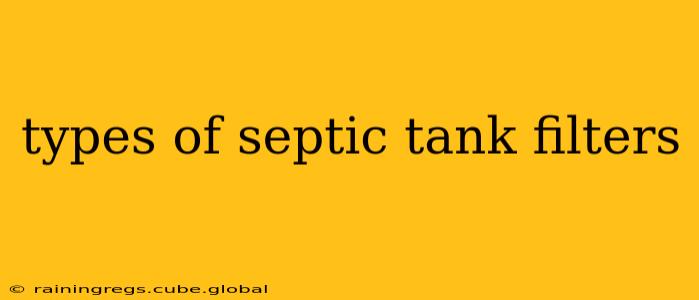Maintaining a healthy septic system is crucial for homeowners relying on on-site wastewater treatment. While regular pumping is essential, incorporating a septic tank filter can significantly enhance the system's efficiency and longevity. But with various types available, choosing the right one can be confusing. This comprehensive guide explores the different types of septic tank filters, outlining their functionalities, pros, and cons to help you make an informed decision.
What are Septic Tank Filters?
Septic tank filters are devices installed either inside or outside the septic tank to remove solids and debris from the wastewater before it enters the drain field. This prevents clogging and extends the lifespan of your leach field, minimizing the risk of costly repairs or replacements. They act as a crucial pre-treatment step, improving the overall performance of your septic system.
Types of Septic Tank Filters: A Detailed Breakdown
Several types of septic tank filters are available, each with its unique characteristics:
1. Woven Fabric Filters
These filters use a tightly woven fabric, often made from polyester or polypropylene, to trap solids. They are relatively inexpensive and easy to install, typically placed inside the septic tank's effluent line.
Pros: Affordable, simple installation.
Cons: Require frequent cleaning or replacement as they can clog quickly, especially in systems with high solids content. Not suitable for all systems.
2. Filter Bags
Similar to woven fabric filters, filter bags are disposable and easily replaceable. They’re often made from a coarser material allowing for better flow and less frequent replacement than woven fabric filters.
Pros: Easy replacement, relatively inexpensive.
Cons: Still prone to clogging, depending on the wastewater. Creates disposal waste.
3. Chamber Filters
These filters utilize a chamber filled with filter media, such as gravel, sand, or specialized filter materials. Wastewater flows through the chamber, allowing solids to settle while cleaner water passes through. They are often installed externally, connected to the septic tank’s effluent line.
Pros: Effective at removing a larger volume of solids, longer lifespan than fabric filters or bags.
Cons: More expensive than fabric filters or bags, require more space for installation. Regular maintenance and potential cleaning is needed.
4. Gravity Filters
These filters rely on gravity to separate solids from wastewater. Water flows slowly through a bed of filter media, allowing solids to settle. The design is typically more compact than chamber filters.
Pros: Efficient solid removal, relatively low maintenance.
Cons: Can be more expensive than other filter types. Flow rate may be slower than other systems.
5. Biofilters
This type employs biological processes in addition to filtration. They contain a bed of media that supports beneficial bacteria which further break down organic matter.
Pros: Superior treatment, reducing the amount of solids that enter the drain field.
Cons: More complex installation, potentially higher initial costs. Regular maintenance may be necessary.
How to Choose the Right Septic Tank Filter
Selecting the ideal septic tank filter depends on several factors:
- Your septic system's size and type: Larger systems may require more robust filters.
- Wastewater characteristics: The amount of solids in your wastewater will influence the filter's capacity and maintenance requirements.
- Budget: Filter costs vary significantly.
- Maintenance capabilities: Consider your ability to clean or replace filters regularly.
Consulting with a septic system professional is highly recommended to determine the most suitable filter for your specific needs. They can assess your system and provide expert advice on the best option for long-term performance and efficiency.
Frequently Asked Questions (FAQ)
How often should I clean or replace my septic tank filter?
The frequency depends on the filter type and your wastewater characteristics. Fabric filters may require cleaning or replacement every few months, while chamber filters might need attention less frequently (annually or even bi-annually). Always follow the manufacturer's recommendations.
Can I install a septic tank filter myself?
While some simpler filters are relatively easy to install, others, like chamber filters, require professional expertise. Improper installation can damage your septic system. It's best to consult a professional for proper installation.
Will a septic tank filter completely eliminate the need for septic tank pumping?
No, septic tank filters don't eliminate the need for regular pumping. They help prolong the lifespan of your system and reduce the frequency of pumping, but sludge and scum still accumulate in the tank.
What are the signs that my septic tank filter needs replacing or cleaning?
Signs include slower drainage, gurgling sounds from drains, sewage backups, and foul odors. If you notice any of these, contact a professional.
What is the average lifespan of a septic tank filter?
This varies greatly depending on the type of filter and the level of maintenance. Some filters may last several years, while others might require replacement after just a few months.
By understanding the various types of septic tank filters and their characteristics, you can make a well-informed decision to improve your septic system's health and efficiency. Remember, regular maintenance and professional advice are essential for optimal performance and longevity.
